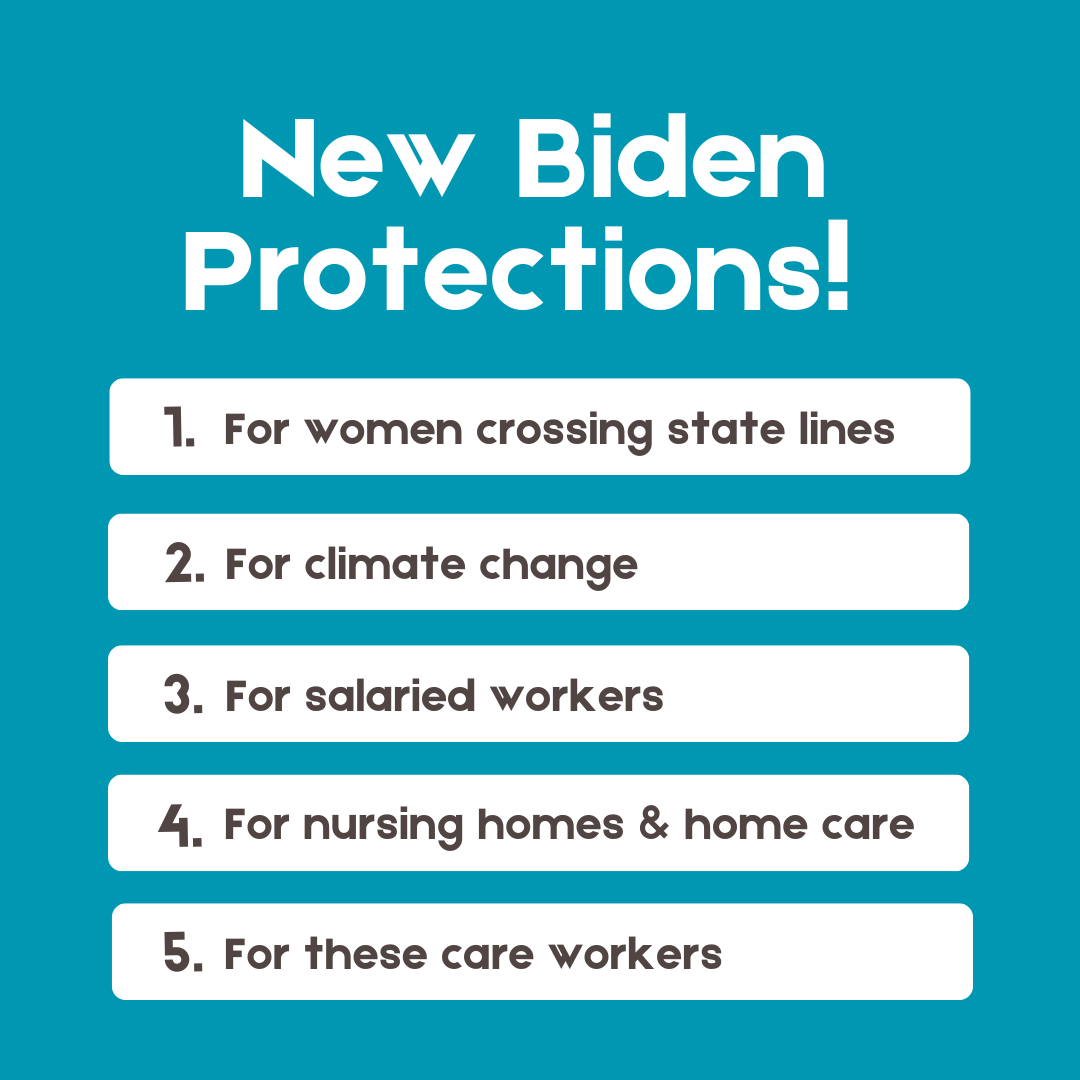Heather Cox Richardson covers recent news from the Biden-Harris administration to protect Americans. Everything from nursing homes, home care and workers to protecting people who cross state lines to obtain abortion, contraception, or fertility treatments from threats by Republican state officials to charge them. And new rules for salaried workers and climate change protections. Thank you, Joe!
In the past two days, the Biden-Harris administration has announced a wide range of new rules to protect ordinary Americans.
Yesterday, Vice President Kamala Harris announced that the administration has finalized two new rules affecting patients in nursing homes and receiving home care, as well as the workers who care for them. The first sets minimum staffing requirements for facilities funded by Medicare and Medicaid, and the second concerns how home healthcare companies account for Medicaid funding.
In a speech at the Hmong Cultural and Community Agency in La Crosse, Wisconsin, Harris noted the extraordinary value of healthcare workers. She also explained that about 1.2 million Americans live in federally funded nursing homes, which make up about four fifths of the nursing homes in the country. But the majority of those homes—about 75% of them—are understaffed. This is dangerous and isolating for patients and demoralizing for workers, who have high rates of burnout and turnover.
Now, nursing homes that receive federal funding will have to provide at least 3.48 hours of nursing care per resident every day, less than the 4.1 hours the Centers for Medicare and Medicaid Services advocate but enough to require the hiring of about 12,000 registered nurses and 77,000 aides, at an annual cost of almost $7 billion.
Consumer organizations and labor unions pushed for the new rule, but nursing home operators strongly oppose the new mandate, saying it will force facilities to close because of a shortage of nurses. In response, Health and Human Services secretary Xavier Becerra told Tami Luhby of CNN that no one should live in facilities that are unsafe or should receive inferior care. Luhby noted that the Centers for Medicare and Medicaid Services in September launched a $75 million campaign to increase the number of nurses in nursing homes.
Consumer organizations and labor unions pushed for the new rule, but nursing home operators strongly oppose the new mandate, saying it will force facilities to close because of a shortage of nurses. In response, Health and Human Services secretary Xavier Becerra told Tami Luhby of CNN that no one should live in facilities that are unsafe or should receive inferior care. Luhby noted that the Centers for Medicare and Medicaid Services in September launched a $75 million campaign to increase the number of nurses in nursing homes.
Also yesterday, the Office for Civil Rights at the U.S. Department of Health and Human Services announced a final rule that strengthens the HIPAA medical privacy rule for people from states that ban abortions who seek reproductive health care in states that permit them. In response to threats by Republican state officials to charge women who cross state lines to obtain abortion, contraception, or fertility treatments, the new rule prohibits health care providers, health plans, and other entities from disclosing patients’ reproductive health care records to state officials when they are being sought to investigate or charge patients, doctors, or others.
Today, the Labor Department announced a new rule that would guarantee that salaried workers who make less than $59,000 a year are compensated fairly for overtime work. The Trump administration set the salary threshold for those who did not have overtime protections at $35,568. As of July 1, 2024, the threshold will be $43,888, and on January 1, 2025, it will rise to $58,656. Senator Patty Murray (D-WA), former chair of the Senate Committee on Health, Education, Labor, and Pensions, said the change could affect 4 million workers.
“Too often, lower-paid salaried workers are doing the same job as their hourly counterparts but are spending more time away from their families for no additional pay,” acting secretary of the Department of Labor Julie Su said. “That is unacceptable. The Biden-Harris administration is following through on our promise to raise the bar for workers who help lay the foundation for our economic prosperity.”
Also today, the Federal Trade Commission (FTC) voted 3–2 along party lines to ban the noncompete agreements that prevent workers from minimum-wage earners to top executives from changing jobs within the industry in which they work; senior executives can still be bound by such agreements. Initially used to protect trade secrets, noncompete clauses have expanded to cover what the FTC estimates to be 30 million people—one in five U.S. workers. They take away workers’ ability to improve their wages and conditions by quitting their jobs and moving to another company or starting their own. The FTC estimates that the end of such clauses could add almost $300 billion a year to workers’ wages.
“Robbing people of their economic liberty also robs them of all sorts of other freedoms,” FTC Chair Lina Khan said. Neil Bradley, head of strategic advocacy for the U.S. Chamber of Commerce, countered: “If they can issue regulations with respect to unfair methods of competition, then there’s really no aspect of the U.S. economy they couldn’t regulate.” The U.S. Chamber of Commerce plans to sue over the rule.
A CBS News/YouGov poll released Monday found that, although Biden and Harris have made addressing climate change a centerpiece of their administration, only 10% of the people who say they think climate change is a very important issue had heard or read a lot about what the administration has accomplished, and 49% said they had read not much or nothing about it. When told some of the things the administration has done, a strong majority of those who care about addressing climate change support those policies.
“Even people who feel the administration has done too little on climate change support these policies,” reporters for CBS News note. They conclude that the disconnect “may be more about Mr. Biden needing to get his message out there than having to convince this ‘climate constituency’—those who call the climate issue very important—of the substance of his policies.”
Continue reading more from this 4/23/24 edition of Letters from an American by Heather Cox Richardson. Her letters always include “notes” to her sources and provide additional insight and original sources. https://open.substack.com/pub/heathercoxrichardson/p/april-23-2024?r=2xyae&utm_campaign=post&utm_medium=email
NOTE: As the 2024 election cycle heats up, RCDP continues to bring you sources from across the web that seek to inform without explicitly endorsing them ourselves. RCDP does not endorse subscriptions or merchandise links that may be embedded within any shared articles, podcasts, videos, or images.

